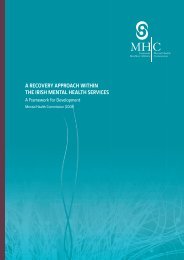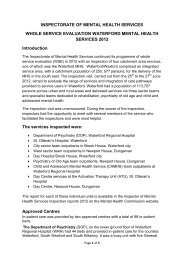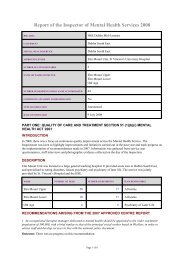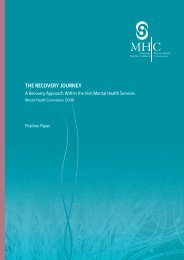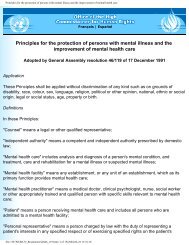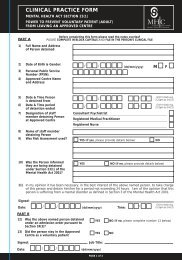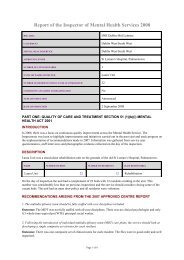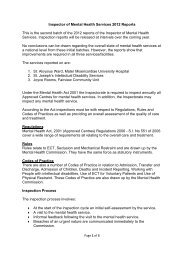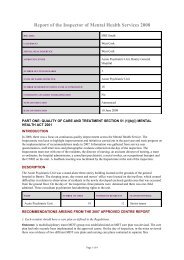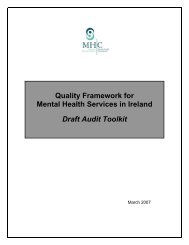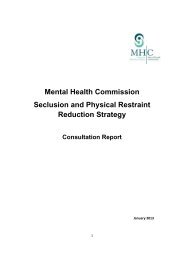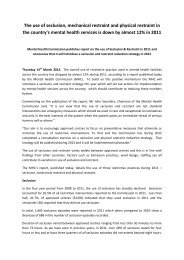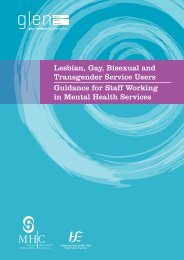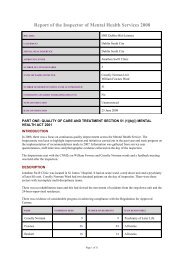a vision for a recovery model in irish mental health services
a vision for a recovery model in irish mental health services
a vision for a recovery model in irish mental health services
You also want an ePaper? Increase the reach of your titles
YUMPU automatically turns print PDFs into web optimized ePapers that Google loves.
A Qualitative Analysis of Submissions to the Mental Health Commission on the Discussion PaperA Vision <strong>for</strong> a Recovery Model <strong>in</strong> Irish Mental Health Servicesof the person to use their own skills, <strong>in</strong><strong>for</strong>mation and professional <strong>services</strong> to take effectivecontrol over their life and to advocate <strong>in</strong> the wider political and professional context <strong>for</strong> aquality service”).The second theme that emerged was one of expressed concern over the suitability of userself-managementprogrammes <strong>for</strong> all service users. The op<strong>in</strong>ion that these programmesare not suitable <strong>for</strong> all service users was most dom<strong>in</strong>ant <strong>in</strong> the HSE group and <strong>in</strong>dividualtranscripts. The general view held that suitability of user-self-management programmeswould depend on severity of <strong>mental</strong> illness. The programmes will require the user toexercise motivation and <strong>in</strong>sight and these characteristics may be lack<strong>in</strong>g <strong>in</strong> some cases.(“Although user-self-management programmes can be an important part of the <strong>recovery</strong>process, these depend greatly on motivation and education. Many people with more serious<strong>mental</strong> <strong>health</strong> problems often lack the motivation necessary to enact self-management andsome will lack the educational preparation needed to access and use self-help materials.Consequently a balance needs to be struck between professional-enabled and user-selfmanagement<strong>recovery</strong> approaches”). A further recommendation made reflected on whenuser-self-management programmes would have potential (“When risk to the service useris no longer an issue, or when on assessment it can be therapeutically managed whileoptimis<strong>in</strong>g freedom and choice, then user self-management programmes have potential”).A m<strong>in</strong>or theme also emerged that highlighted the need <strong>for</strong> special tra<strong>in</strong><strong>in</strong>g <strong>for</strong> serviceproviders to facilitate user-self-management programmes (“If the majority of staffresponsible <strong>for</strong> deliver<strong>in</strong>g <strong>mental</strong> <strong>health</strong> <strong>services</strong> do not undergo the necessary tra<strong>in</strong><strong>in</strong>g thatwill enable them to embrace the pr<strong>in</strong>cipals of Recovery, <strong>in</strong> practise such programmes will bepaper exercises”).The Commission is referred to:∆ Chapter on Recovery from a recent publication (Turner, 2006).∆ A submission 6 which proposes the development of an <strong>in</strong>dividualised CCSM programme<strong>for</strong> people with <strong>mental</strong> <strong>health</strong> problems and expresses <strong>in</strong>terest <strong>in</strong> research<strong>in</strong>g this areafurther (perhaps with the support of the MHC, <strong>for</strong> Irish <strong>mental</strong> <strong>health</strong> <strong>services</strong>).6Pr<strong>in</strong>cipal Cl<strong>in</strong>ical Psychologist, St. Senan’s Hospital, HSE – South east region.22



